 What’s on my mind this month are the many innovations in education we have implemented at the School of Medicine over the last year, fulfilling one of the key goals of Shared Vision 2020, to introduce a new teaching philosophy focused on training the next generation of innovators and discoverers.
What’s on my mind this month are the many innovations in education we have implemented at the School of Medicine over the last year, fulfilling one of the key goals of Shared Vision 2020, to introduce a new teaching philosophy focused on training the next generation of innovators and discoverers.
Over several issues of SOMnews, we have discussed the progress of the new Foundations of Research and Critical Thinking (FRCT) course, and have shared the thoughts of the faculty leaders who brought this course into fruition. This revolutionary approach to implementing a culture of inquisitiveness and analytical thinking skills in our medical students, as well as impressing upon them the integral role that biomedical research plays in transforming medical practice, has caught the attention of the national media. This course has been mentioned in US News & World Report, as well as in the academic medical community, with our FRCT course being featured in recent issues of The Chronicle of Higher Education and the AAMC Reporter. However, we must never lose sight of how this course has and will impact our students and their perception of what research means to their chosen career path. Therefore, I am very pleased that in this issue of the newsletter, we include an article that shares medical students’ perspectives of the new required course.
Not only do we want to impress upon all our students the importance of research from the perspective of the healthcare practitioner or scientific researcher, but we also want them to realize the impact that research has on them as patients. Last year, we highlighted a summer elective course for our second-year medical students, called the “Personal Genomes in Medicine.” Co-directed by Alan Shuldiner, MD, and Miriam Blitzer, PhD, the course gives students a glimpse into the world of personalized medicine, and a greater understanding of how a patient’s genetic information could be used to tailor treatment and therapies. Students who chose to take this elective received an opportunity to genotype their own blood to search for genetic markers that could predict their response to certain medications, as well as markers that could predict potential side effects to medications.
The success of the course, and the powerful effect that analyzing one’s own genes can have on a developing physician, led us to expand this opportunity to all incoming medical students. This fall, our second-year medical students will have a chance to examine their own genetic data to determine which drugs they might be predicted to respond to and which drugs they might want to avoid, based on their examination of a select group of genetic markers.
Our graduate students continue to conduct outstanding research, presenting at national conferences, publishing in high-impact journals, and successfully competing for federal research funding. The School of Medicine programs equip our students with the skills necessary to launch their careers as independent investigators. However, the most successful scientists today are not only the most inquisitive and adept in the laboratory, but also those who can convey their work and their enthusiasm for science to multiple audiences. In this age of social media, online publishing, YouTube, and other mass communication outlets, scientists must be able to discuss their research articulately for their peers, grant reviewers, and, potentially, the evening national news. Effective communications skills must be practiced and refined, which is why I am pleased that the School of Medicine’s Office of Public Affairs and Communications will kick off its second Science Communications Internship for graduate students and postdoctoral fellows this month.
As I considered the question of who exactly are the “next generation of innovators and discoverers,” my answer comprises many different groups of individuals. Our current medical, allied health and graduate students represent one group. Indeed, these individuals have chosen to pursue careers in medicine and biomedical research, contributing in a variety of methods to a greater understanding of human health and disease, thereby improving the well-being of all people. However, a passion to pursue medicine often begins long before medical or graduate school, and even before college. With the increased emphasis in science, technology, engineering and mathematics (STEM) education, young minds are being encouraged to seek answers to some of the most vexing problems in health today.
For example, the Society for Science & the Public has held a Science Talent Search for high school students for over seventy years. Sponsored by the Intel Company since 1998, this competition recognizes exceptional high school senior research projects. The 2014 winner, a 17-year-old from California, used a multidisciplinary approach to identify a potential new class of drugs against the influenza virus. Other finalists in this year’s competition developed projects that may provide insights into arrhythmias, predict the spread of breast cancer, and determine the effects of exposure to electronics on adolescent sleep, learning and stress.
These young minds are truly incredible, and their bold, perhaps brash, approaches to solving complex biomedical questions are desperately needed in research today. In our most recent update on the Accelerating Innovation and Discovery in Medicine (ACCEL-Med) initiative, I briefly mentioned the School of Medicine’s new “Young Brain Initiative (YBI).” My goal for this program is to encourage the type of innovative, “outside the box” thinking which led a young physician and a medical student to discover insulin. The YBI will not only encourage our students to pursue major research questions, but senior faculty and staff will help guide the most promising student projects, and those students will receive recognition for their incredible efforts at future graduation award ceremonies.
As we head into the summer months, we reflect on the many new directions our educational initiatives will take our current and incoming students and how these steps move us ever closer to fulfilling our Vision 2020.
In the relentless pursuit of excellence, I am
Sincerely yours,
E. Albert Reece, MD, PhD, MBA
Vice President for Medical Affairs, University of Maryland
John Z. and Akiko K. Bowers Distinguished Professor and
Dean, University of Maryland School of Medicine
Appointments
 Curtis Adams, MD, Assistant Professor, Department of Psychiatry, has been appointed Associate Editor of Community Mental Health Journal.
Curtis Adams, MD, Assistant Professor, Department of Psychiatry, has been appointed Associate Editor of Community Mental Health Journal.
 Mark Ehrenreich, MD, Assistant Professor, Department of Psychiatry, has been appointed Chief of Medical Education for the department. Dr. Ehrenreich, who is also Director of the Division of Consultation Liaison Psychiatry, was previously Director of Education and Training. Under his leadership, the department initiated a fellowship program in Consultation Liaison Psychiatry in 1995, and in 2004 this program became officially certified under the new Accreditation Council for Graduate Medical Education (ACGME) fellowship program in Psychosomatic Medicine. He has been active in the fellowship committee of the Academy of Psychosomatic Medicine, the national organization of consultation liaison psychiatrists. Dr. Ehrenreich is a Distinguished Fellow of the American Psychiatric Association and was recently named a Fellow of the Academy of Psychosomatic Medicine.
Mark Ehrenreich, MD, Assistant Professor, Department of Psychiatry, has been appointed Chief of Medical Education for the department. Dr. Ehrenreich, who is also Director of the Division of Consultation Liaison Psychiatry, was previously Director of Education and Training. Under his leadership, the department initiated a fellowship program in Consultation Liaison Psychiatry in 1995, and in 2004 this program became officially certified under the new Accreditation Council for Graduate Medical Education (ACGME) fellowship program in Psychosomatic Medicine. He has been active in the fellowship committee of the Academy of Psychosomatic Medicine, the national organization of consultation liaison psychiatrists. Dr. Ehrenreich is a Distinguished Fellow of the American Psychiatric Association and was recently named a Fellow of the Academy of Psychosomatic Medicine.
 Linda Martin, MD, MPH, Assistant Professor, Department of Surgery, was named director of the Lung Cancer Screening Program at the University of Maryland’s Upper Chesapeake Medical Center. Since beginning this program in June 2013, Dr. Martin has screened more than 120 patients. Dr. Martin has also been named Vice-Chair for the Thoracic Surgery Group for the Alliance for Clinical Trials in Oncology.
Linda Martin, MD, MPH, Assistant Professor, Department of Surgery, was named director of the Lung Cancer Screening Program at the University of Maryland’s Upper Chesapeake Medical Center. Since beginning this program in June 2013, Dr. Martin has screened more than 120 patients. Dr. Martin has also been named Vice-Chair for the Thoracic Surgery Group for the Alliance for Clinical Trials in Oncology.
 E. Albert Reece, MD, PhD, MBA, Vice President for Medical Affairs, University of Maryland, and the John Z. and Akiko K. Bowers Distinguished Professor and Dean of the School of Medicine, has been elected to the Research!America Board of Directors.
E. Albert Reece, MD, PhD, MBA, Vice President for Medical Affairs, University of Maryland, and the John Z. and Akiko K. Bowers Distinguished Professor and Dean of the School of Medicine, has been elected to the Research!America Board of Directors.
Community Service
 Lauren Richter, DO, Assistant Professor, Family & Community Medicine, and Assistant Clinical Director, Center for Integrative Medicine, regularly donates her services as an acupuncturist at the Shepherd’s Clinic, which provides low-cost primary care to the poor in Central Baltimore.
Lauren Richter, DO, Assistant Professor, Family & Community Medicine, and Assistant Clinical Director, Center for Integrative Medicine, regularly donates her services as an acupuncturist at the Shepherd’s Clinic, which provides low-cost primary care to the poor in Central Baltimore.
 Sharon Stephan, PhD, Associate Professor, Department of Psychiatry, traveled to South Korea to provide training and guidance to leadership of the Korea Brain Research Institute and its newly established School Mental Health Research Center. Dr. Stephan, as well as two child and adolescent psychiatrists from Harvard University and the National Institute of Mental Health, worked with South Korean academic and political leadership to consider school-based approaches to addressing their increasing suicide rate among young people. Dr. Stephan also provided training on school-based trauma and bullying interventions to approximately 300 teachers, principals and school- and community-based mental health specialists.
Sharon Stephan, PhD, Associate Professor, Department of Psychiatry, traveled to South Korea to provide training and guidance to leadership of the Korea Brain Research Institute and its newly established School Mental Health Research Center. Dr. Stephan, as well as two child and adolescent psychiatrists from Harvard University and the National Institute of Mental Health, worked with South Korean academic and political leadership to consider school-based approaches to addressing their increasing suicide rate among young people. Dr. Stephan also provided training on school-based trauma and bullying interventions to approximately 300 teachers, principals and school- and community-based mental health specialists.
Events, Lectures & Workshops
 Cynthia Bearer, MD, PhD, the Mary Gray Cobey Professor of Neonatology, Department of Pediatrics, presented her research work at the Glycolipid & Sphingolipid Gordon Research Conference in Ventura, CA, on January 16. She also presented four lectures at the 9th Hot Topics in Neonatal Medicine Symposium, held in February in Jeddah, Kingdom of Saudi Arabia: What’s an Environmentalist Doing in the NICU?; Heavy Metals in Donor Blood; Chlorhexidine—A Hazard for Preemies?; and Nutrition and Neurodevelopment. Additionally, she testified on March 25 before the U.S. House Subcommittee on Labor, Health & Human Services, Education & Related Agencies, United States House Committee on Appropriations, regarding appropriations for Fiscal Year 2015, in support of pediatric research on environmental health.
Cynthia Bearer, MD, PhD, the Mary Gray Cobey Professor of Neonatology, Department of Pediatrics, presented her research work at the Glycolipid & Sphingolipid Gordon Research Conference in Ventura, CA, on January 16. She also presented four lectures at the 9th Hot Topics in Neonatal Medicine Symposium, held in February in Jeddah, Kingdom of Saudi Arabia: What’s an Environmentalist Doing in the NICU?; Heavy Metals in Donor Blood; Chlorhexidine—A Hazard for Preemies?; and Nutrition and Neurodevelopment. Additionally, she testified on March 25 before the U.S. House Subcommittee on Labor, Health & Human Services, Education & Related Agencies, United States House Committee on Appropriations, regarding appropriations for Fiscal Year 2015, in support of pediatric research on environmental health.
 Kevin Chen, PhD, MPH, Associate Professor, Department of Family & Community Medicine and Center for Integrative Medicine, is co-chair of the Science (Research) Symposium for the 2014 International Society for the Study of Subtle Energy and Energy Medicine (ISSSEEM) Conference, taking place June 11–12 in Unity Village, MO.
Kevin Chen, PhD, MPH, Associate Professor, Department of Family & Community Medicine and Center for Integrative Medicine, is co-chair of the Science (Research) Symposium for the 2014 International Society for the Study of Subtle Energy and Energy Medicine (ISSSEEM) Conference, taking place June 11–12 in Unity Village, MO.
 Alan Faden, MD, presented “Heads Up: Revising Concepts of Brain Trauma and Sport-Related Injury” to the Environmental Protection Agency on March 25.
Alan Faden, MD, presented “Heads Up: Revising Concepts of Brain Trauma and Sport-Related Injury” to the Environmental Protection Agency on March 25.
 Catherine Harrison-Restelli, MD, Assistant Professor, Department of Psychiatry, gave a presentation on the University of Maryland School of Medicine’s Psychosomatic Medicine Interest Group (PMIG) at the Annual Meeting of the American Psychosomatic Society in March 2014.
Catherine Harrison-Restelli, MD, Assistant Professor, Department of Psychiatry, gave a presentation on the University of Maryland School of Medicine’s Psychosomatic Medicine Interest Group (PMIG) at the Annual Meeting of the American Psychosomatic Society in March 2014.
 Eric Manheimer, PhD, Research Associate, Department of Family & Community Medicine, and Coordinator of the Cochrane Collaboration CAM Field, Center for Integrative Medicine, led a half-day pre-conference workshop entitled “Evaluating and Interpreting Systematic Reviews in CAM: Acupuncture as an Example” on May 13 at the 2014 International Research Congress on Integrative Medicine and Health in Miami, FL. He also presented at a three-day “Workshop on Developing a Systematic Review” from April 14–16, at the Caribbean Branch of the United States Cochrane Center, University of the West Indies, Mona, Jamaica.
Eric Manheimer, PhD, Research Associate, Department of Family & Community Medicine, and Coordinator of the Cochrane Collaboration CAM Field, Center for Integrative Medicine, led a half-day pre-conference workshop entitled “Evaluating and Interpreting Systematic Reviews in CAM: Acupuncture as an Example” on May 13 at the 2014 International Research Congress on Integrative Medicine and Health in Miami, FL. He also presented at a three-day “Workshop on Developing a Systematic Review” from April 14–16, at the Caribbean Branch of the United States Cochrane Center, University of the West Indies, Mona, Jamaica.
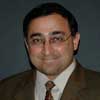 Amal Mattu, MD, Professor; Haney Mallemat, MD, Assistant Professor; and Mimi Lu, MD, Clinical Assistant Professor, all from the Department of Emergency Medicine, served in leadership roles and as faculty members for Resuscitation 2014, an annual conference focused on the care of critically ill and injured patients. This year’s conference, held in Las Vegas in late March, was attended by more than 400 physicians from various medical specialties and countries. Dr. Mattu and Dr. Mallemat were two of the five conference co-directors and lectured on emergency cardiology and critical-care topics, respectively. In addition, Dr. Mattu conducted a three-hour workshop on advanced dysrhythmias and co-directed a “critical-care boot camp.” Dr. Lu presented lectures on emergency pediatric care and co-directed a “pediatric emergencies boot camp.”
Amal Mattu, MD, Professor; Haney Mallemat, MD, Assistant Professor; and Mimi Lu, MD, Clinical Assistant Professor, all from the Department of Emergency Medicine, served in leadership roles and as faculty members for Resuscitation 2014, an annual conference focused on the care of critically ill and injured patients. This year’s conference, held in Las Vegas in late March, was attended by more than 400 physicians from various medical specialties and countries. Dr. Mattu and Dr. Mallemat were two of the five conference co-directors and lectured on emergency cardiology and critical-care topics, respectively. In addition, Dr. Mattu conducted a three-hour workshop on advanced dysrhythmias and co-directed a “critical-care boot camp.” Dr. Lu presented lectures on emergency pediatric care and co-directed a “pediatric emergencies boot camp.”
 Michelle Pearce, PhD, Assistant Professor, Department of Family and Community Medicine and Center for Integrative Medicine, will be presenting a featured symposium called “Religiously Integrated Cognitive-Behavioral Therapy: A New Method of Treatment for Major Depression?” at the American Psychological Association’s annual convention in August 2014 in Washington, DC.
Michelle Pearce, PhD, Assistant Professor, Department of Family and Community Medicine and Center for Integrative Medicine, will be presenting a featured symposium called “Religiously Integrated Cognitive-Behavioral Therapy: A New Method of Treatment for Major Depression?” at the American Psychological Association’s annual convention in August 2014 in Washington, DC.
 Gloria Reeves, MD, Assistant Professor in the Department of Psychiatry, was invited by the Patient Centered Outcomes Research Institute (PCORI) to present at the 2014 Association for Community Health Improvement national meeting in Orlando, FL, in March. Dr. Reeves was one of three PCORI-funded researchers invited to present on the topic of engaging consumers as research partners in a workshop titled “Patient-Centered Outcomes Research: A New Opportunity for Hospitals, Health Systems, and Community Health Workers.”
Gloria Reeves, MD, Assistant Professor in the Department of Psychiatry, was invited by the Patient Centered Outcomes Research Institute (PCORI) to present at the 2014 Association for Community Health Improvement national meeting in Orlando, FL, in March. Dr. Reeves was one of three PCORI-funded researchers invited to present on the topic of engaging consumers as research partners in a workshop titled “Patient-Centered Outcomes Research: A New Opportunity for Hospitals, Health Systems, and Community Health Workers.”
 Lauren Richter, DO, Assistant Professor, Family & Community Medicine, and Assistant Clinical Director, Center for Integrative Medicine, presented “Parkinson’s Disease—An Integrative Holistic Approach” for the Parkinson’s Support Group at the Riderwood Community in Silver Spring, MD, in March.
Lauren Richter, DO, Assistant Professor, Family & Community Medicine, and Assistant Clinical Director, Center for Integrative Medicine, presented “Parkinson’s Disease—An Integrative Holistic Approach” for the Parkinson’s Support Group at the Riderwood Community in Silver Spring, MD, in March.
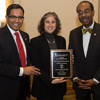 The inaugural Gold Humanism Honor Society Visiting Professorship Lecture was held at the SMC Campus Center in March. The speaker was Danielle Ofri, MD, PhD, Associate Professor, NYU Langone School of Medicine; co-founder and Editor-in-Chief of the Bellevue Literary Review, the first literary journal to arise from a medical setting; and author of numerous medical-related books, primarily focusing on doctor/patient relationships. Mayur Narayan, MD, MPH, MBA, Assistant Professor, Department of Surgery, coordinated the lecture, which was part of a Humanism Symposium elective course for first- and second-year medical students.
The inaugural Gold Humanism Honor Society Visiting Professorship Lecture was held at the SMC Campus Center in March. The speaker was Danielle Ofri, MD, PhD, Associate Professor, NYU Langone School of Medicine; co-founder and Editor-in-Chief of the Bellevue Literary Review, the first literary journal to arise from a medical setting; and author of numerous medical-related books, primarily focusing on doctor/patient relationships. Mayur Narayan, MD, MPH, MBA, Assistant Professor, Department of Surgery, coordinated the lecture, which was part of a Humanism Symposium elective course for first- and second-year medical students.
Grants & Contracts
 Joanne Dorgan, PhD, MPH, Professor, Department of Epidemiology & Public Health, received a two-year $23,801 award from the American Institute for Cancer Research (via Brigham Women’s Hospital) for a study entitled “Body Size at Young Age and Novel Biomarkers of Breast Cancer Risk.”
Joanne Dorgan, PhD, MPH, Professor, Department of Epidemiology & Public Health, received a two-year $23,801 award from the American Institute for Cancer Research (via Brigham Women’s Hospital) for a study entitled “Body Size at Young Age and Novel Biomarkers of Breast Cancer Risk.”
 Sarah Edwards, DO, and Sean Pustilnik, MD, both Assistant Professors, Department of Psychiatry, were awarded a seed grant for $6,000 from the Center for Interprofessional Education at the University of Maryland, Baltimore. The project, “The Pediatric TEAM (Training, Education, Assessment, and Management of Delirium) Program: An Interprofessional Collaboration and Education Curriculum in the Critical Care Setting,” is a collaboration among experts from the School of Medicine (L. Kyle Walker, MD, Assistant Professor, Department of Pediatrics), School of Nursing (Shari Simone, DNP, CPNP-AC) and School of Pharmacy (Allison Lardieri, PharmD, and Susan dosReis, PhD).
Sarah Edwards, DO, and Sean Pustilnik, MD, both Assistant Professors, Department of Psychiatry, were awarded a seed grant for $6,000 from the Center for Interprofessional Education at the University of Maryland, Baltimore. The project, “The Pediatric TEAM (Training, Education, Assessment, and Management of Delirium) Program: An Interprofessional Collaboration and Education Curriculum in the Critical Care Setting,” is a collaboration among experts from the School of Medicine (L. Kyle Walker, MD, Assistant Professor, Department of Pediatrics), School of Nursing (Shari Simone, DNP, CPNP-AC) and School of Pharmacy (Allison Lardieri, PharmD, and Susan dosReis, PhD).
 Anthony Harris, MD, MPH, Professor, Department of Epidemiology & Public Health, and Jennifer Johnson, PhD, Associate Professor, Department of Pathology, received a one-year, $143,058 award from Cubist Pharmaceuticals to study “Risk Factors for Pseudomonas on ICU Admission and Prevalence of Antibiotic-Resistant Pseudomonas on Admission.”
Anthony Harris, MD, MPH, Professor, Department of Epidemiology & Public Health, and Jennifer Johnson, PhD, Associate Professor, Department of Pathology, received a one-year, $143,058 award from Cubist Pharmaceuticals to study “Risk Factors for Pseudomonas on ICU Admission and Prevalence of Antibiotic-Resistant Pseudomonas on Admission.”
 Simeon Goldblum, MD, Professor, Department of Medicine and Pathology, received a four-year, $649,954 Merit Review grant from the Department of Veterans Affairs for “NEU1 Sialidase Disrupts CD31-Driven Angiogenesis in Human Lung Endothelia.”
Simeon Goldblum, MD, Professor, Department of Medicine and Pathology, received a four-year, $649,954 Merit Review grant from the Department of Veterans Affairs for “NEU1 Sialidase Disrupts CD31-Driven Angiogenesis in Human Lung Endothelia.”
 Britta Hahn, PhD, Assistant Professor, Department of Psychiatry, has been awarded a five-year, $2 million RO1 grant from the National Institute on Drug Abuse (NIDA) for “Mechanisms Mediating the Attention-Enhancing Effects of Nicotinic Receptor Agents.”
Britta Hahn, PhD, Assistant Professor, Department of Psychiatry, has been awarded a five-year, $2 million RO1 grant from the National Institute on Drug Abuse (NIDA) for “Mechanisms Mediating the Attention-Enhancing Effects of Nicotinic Receptor Agents.”
 Seth Himelhoch, MD, MPH, Associate Professor, Department of Psychiatry, has received funding from the American Psychosomatic Society (APS) to start a Psychosomatic Medicine Interest Group (PMIG) at the School of Medicine.
Seth Himelhoch, MD, MPH, Associate Professor, Department of Psychiatry, has received funding from the American Psychosomatic Society (APS) to start a Psychosomatic Medicine Interest Group (PMIG) at the School of Medicine.
 Daniel Mascarenhas, MS-I, has been awarded a $3,000 Research Medical Student Grant from the Radiological Society of North America for “Is CT SLIC Enough?—The Subaxial Cervical Spine Injury Classification (SLIC) System: Can CT Alone Predict the Need for Surgical Intervention?” He will work this summer with David Dreizin, MD, Assistant Professor, Department of Diagnostic Radiology & Nuclear Medicine, to evaluate whether SLIC remains a reliable initial triaging tool when CT is used as the sole imaging modality.
Daniel Mascarenhas, MS-I, has been awarded a $3,000 Research Medical Student Grant from the Radiological Society of North America for “Is CT SLIC Enough?—The Subaxial Cervical Spine Injury Classification (SLIC) System: Can CT Alone Predict the Need for Surgical Intervention?” He will work this summer with David Dreizin, MD, Assistant Professor, Department of Diagnostic Radiology & Nuclear Medicine, to evaluate whether SLIC remains a reliable initial triaging tool when CT is used as the sole imaging modality.
 Anne Rositch, PhD, MSPH, Assistant Professor, Department of Epidemiology & Public Health, received a nine-month, $82,500 award from the George W. Bush Presidential Center to study the “Estimation of Lives Saved by Cervical Cancer Services.”
Anne Rositch, PhD, MSPH, Assistant Professor, Department of Epidemiology & Public Health, received a nine-month, $82,500 award from the George W. Bush Presidential Center to study the “Estimation of Lives Saved by Cervical Cancer Services.”
 Sharon Stephan, PhD, Associate Professor, Department of Psychiatry, was awarded a four-year, $1.3 million award from the Substance Abuse and Mental Health Services Administration (as a subcontract from American Institutes for Research) to provide technical assistance as part of the new National Resource Center for Mental Health Promotion and Youth Violence Prevention. Dr. Stephan and her colleagues at the Center for School Mental Health in the Division of Child and Adolescent Psychiatry will provide support to Safe Schools-Healthy Students grantees across the United States.
Sharon Stephan, PhD, Associate Professor, Department of Psychiatry, was awarded a four-year, $1.3 million award from the Substance Abuse and Mental Health Services Administration (as a subcontract from American Institutes for Research) to provide technical assistance as part of the new National Resource Center for Mental Health Promotion and Youth Violence Prevention. Dr. Stephan and her colleagues at the Center for School Mental Health in the Division of Child and Adolescent Psychiatry will provide support to Safe Schools-Healthy Students grantees across the United States.
 Jian Sun, PhD, Assistant Professor, Department of Medicine, received a three-year, $345,000 grant from the American Diabetes Association to study “The Improvement of Glucose Metabolism By a FDA-Approved Drug That Was Used for Alzheimer Patients.”
Jian Sun, PhD, Assistant Professor, Department of Medicine, received a three-year, $345,000 grant from the American Diabetes Association to study “The Improvement of Glucose Metabolism By a FDA-Approved Drug That Was Used for Alzheimer Patients.”
 Susan Wright, PhD, and Andrea Wijtenburg, PhD, both T32 Fellows at the Department of Psychiatry’s Maryland Psychiatric Research Center (MPRC), both received travel awards to attend the 4th Schizophrenia International Research Society Conference in early April in Florence, Italy, where Susan presented “White Matter Perfusion Fraction in Schizophrenia and Deficits in Processing Speed.”
Susan Wright, PhD, and Andrea Wijtenburg, PhD, both T32 Fellows at the Department of Psychiatry’s Maryland Psychiatric Research Center (MPRC), both received travel awards to attend the 4th Schizophrenia International Research Society Conference in early April in Florence, Italy, where Susan presented “White Matter Perfusion Fraction in Schizophrenia and Deficits in Processing Speed.”
Honors & Awards
 Barbara Burns, BA, C-TAGME, Manager of the Division of Education in the Department of Psychiatry, and residency coordinator of the University of Maryland/Sheppard Pratt psychiatry residency program, was awarded the American Association of Directors of Psychiatric Residency Training (AADPRT) Residency Coordinators’ Recognition Award at the AADPRT Annual Meeting in March.
Barbara Burns, BA, C-TAGME, Manager of the Division of Education in the Department of Psychiatry, and residency coordinator of the University of Maryland/Sheppard Pratt psychiatry residency program, was awarded the American Association of Directors of Psychiatric Residency Training (AADPRT) Residency Coordinators’ Recognition Award at the AADPRT Annual Meeting in March.
 Carnell Cooper, MD, Clinical Associate Professor, Department of Surgery, was named this year’s Hometown Hero by the American Red Cross of the Chesapeake Region on March 27. The Hometown Hero award recognizes an individual within the public service sector who demonstrates an exceptional commitment to the mission and clients of the organization they serve. Through the Violence Intervention Program at the R Adams Cowley Shock Trauma Center, Dr. Cooper helps victims of intentional violence and perpetrators of violence to make critical changes in their lives by providing a multidisciplinary support system that offers assessment, counseling, and social support.
Carnell Cooper, MD, Clinical Associate Professor, Department of Surgery, was named this year’s Hometown Hero by the American Red Cross of the Chesapeake Region on March 27. The Hometown Hero award recognizes an individual within the public service sector who demonstrates an exceptional commitment to the mission and clients of the organization they serve. Through the Violence Intervention Program at the R Adams Cowley Shock Trauma Center, Dr. Cooper helps victims of intentional violence and perpetrators of violence to make critical changes in their lives by providing a multidisciplinary support system that offers assessment, counseling, and social support.
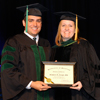 Stephanie Knight, MD, Assistant Professor, Department of Psychiatry, was selected by the Class of 2014 to receive the 2014 Student Council Award for Best Clinical Faculty.
Stephanie Knight, MD, Assistant Professor, Department of Psychiatry, was selected by the Class of 2014 to receive the 2014 Student Council Award for Best Clinical Faculty.
 Robert Redfield, MD, Associate Director, Institute of Human Virology, and Professor, Department of Medicine, received the 2013 My Hero Award, presented at the AID FOR AIDS Annual My Hero Gala in New York City. The My Hero Award honors people from the arts, business, public health, philanthropic, and other communities who have made substantial contributions to the fight against HIV and AIDS. Dr. Redfield’s impressive career in medical research and deep commitment to finding effective forms of treatment for people with HIV—including his work at IHV to ensure quality treatment for people in some of the poorest countries in the world—made the organization “proud to recognize Dr. Redfield as a hero in our common struggle against the HIV epidemic.”
Robert Redfield, MD, Associate Director, Institute of Human Virology, and Professor, Department of Medicine, received the 2013 My Hero Award, presented at the AID FOR AIDS Annual My Hero Gala in New York City. The My Hero Award honors people from the arts, business, public health, philanthropic, and other communities who have made substantial contributions to the fight against HIV and AIDS. Dr. Redfield’s impressive career in medical research and deep commitment to finding effective forms of treatment for people with HIV—including his work at IHV to ensure quality treatment for people in some of the poorest countries in the world—made the organization “proud to recognize Dr. Redfield as a hero in our common struggle against the HIV epidemic.”
 Larry Weiss, MD, JD, Professor, Department of Emergency Medicine, was the recipient of the 2014 David Wagner Award from the American Academy of Emergency Medicine (AAEM). This career award, the most prestigious among AAEM’s honors, recognizes national leadership in emergency medicine. Dr. Weiss served as president of AAEM from 2008 to 2010.
Larry Weiss, MD, JD, Professor, Department of Emergency Medicine, was the recipient of the 2014 David Wagner Award from the American Academy of Emergency Medicine (AAEM). This career award, the most prestigious among AAEM’s honors, recognizes national leadership in emergency medicine. Dr. Weiss served as president of AAEM from 2008 to 2010.
In the News
 Cynthia Bearer, MD, PhD, the Mary Gray Cobey Professor of Neonatology, Department of Pediatrics, was interviewed on radio station WYPR on March 13. The topic was premature birth.
Cynthia Bearer, MD, PhD, the Mary Gray Cobey Professor of Neonatology, Department of Pediatrics, was interviewed on radio station WYPR on March 13. The topic was premature birth.
 Philip Mackowiak, MD, MBA, Clinical Professor, Department of Medicine, was co-author on the March 31 New York Times article “What Really Killed William Henry Harrison?”
Philip Mackowiak, MD, MBA, Clinical Professor, Department of Medicine, was co-author on the March 31 New York Times article “What Really Killed William Henry Harrison?”
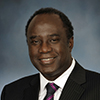 The University of Maryland Department of Psychiatry was selected as one of the top 15 internationally recognized departments to be featured in a video that was broadcast at the 167th Annual Meeting of the American Psychiatric Association, held in New York City in early May. Five members of the department discussed current issues and research relevant to achieving the department’s mission and goals: Bankole Johnson, DSc, MD, MB, ChB, MPhil (pictured), Professor and Chairman of the Department of Psychiatry, Professor of Pharmacology and Anatomy & Neurobiology, and Director of the Brain Science Research Consortium Unit; Jill RachBeisel, MD, Associate Professor of Psychiatry and Chief of Clinical Services; Robert Buchanan, MD, Professor of Psychiatry and Interim Director of the Maryland Psychiatric Research Center (MPRC); Diana Fishbein, PhD, Professor of Psychiatry and Director of the Center for Translational Research on Adversity, Neurodevelopment and Substance Abuse (C-TRANS); and Deanna Kelly, PharmD, BCPP, Professor of Psychiatry and Director of the MPRC Treatment Research Program and Brief Stay Unit.
The University of Maryland Department of Psychiatry was selected as one of the top 15 internationally recognized departments to be featured in a video that was broadcast at the 167th Annual Meeting of the American Psychiatric Association, held in New York City in early May. Five members of the department discussed current issues and research relevant to achieving the department’s mission and goals: Bankole Johnson, DSc, MD, MB, ChB, MPhil (pictured), Professor and Chairman of the Department of Psychiatry, Professor of Pharmacology and Anatomy & Neurobiology, and Director of the Brain Science Research Consortium Unit; Jill RachBeisel, MD, Associate Professor of Psychiatry and Chief of Clinical Services; Robert Buchanan, MD, Professor of Psychiatry and Interim Director of the Maryland Psychiatric Research Center (MPRC); Diana Fishbein, PhD, Professor of Psychiatry and Director of the Center for Translational Research on Adversity, Neurodevelopment and Substance Abuse (C-TRANS); and Deanna Kelly, PharmD, BCPP, Professor of Psychiatry and Director of the MPRC Treatment Research Program and Brief Stay Unit.
New Faculty
Annabelle Mimi  Belcher, PhD, was appointed Assistant Professor in the Department of Psychiatry in March. In addition to continuing her ongoing studies investigating resting-state functional connectivity using fMRI in non-human primates (in collaboration with labs from NIDA and NINDS), Dr. Belcher will be assisting with the development of the newly established Brain Science Research Consortium Unit (BSRCU), under the direction of the department’s new Chair, Bankole Johnson, DSc, MD, MB, ChB, MPhil, FRCPsych, DFAPA, FACFEI. Dr. Belcher comes to the University from the National Institute on Drug Abuse Intramural Research Program, where she was a postdoctoral IRTA fellow in the Neuroimaging Research Branch. Dr. Belcher’s main research interest is in the study of the function of brain systems that determine individual differences in non-human primates, which can be used as animal models of personality traits and of endophenotypes of neuropsychiatric disorders.
Belcher, PhD, was appointed Assistant Professor in the Department of Psychiatry in March. In addition to continuing her ongoing studies investigating resting-state functional connectivity using fMRI in non-human primates (in collaboration with labs from NIDA and NINDS), Dr. Belcher will be assisting with the development of the newly established Brain Science Research Consortium Unit (BSRCU), under the direction of the department’s new Chair, Bankole Johnson, DSc, MD, MB, ChB, MPhil, FRCPsych, DFAPA, FACFEI. Dr. Belcher comes to the University from the National Institute on Drug Abuse Intramural Research Program, where she was a postdoctoral IRTA fellow in the Neuroimaging Research Branch. Dr. Belcher’s main research interest is in the study of the function of brain systems that determine individual differences in non-human primates, which can be used as animal models of personality traits and of endophenotypes of neuropsychiatric disorders.
 Diana Fishbein, PhD, was appointed Professor in the Department of Psychiatry in March. She also will serve as Director of the Center for Translational Research on Adversity, Neurodevelopment and Substance Abuse (C-TRANS) in the Department of Psychiatry. She is an adjunct associate professor at Johns Hopkins University, a faculty subcontractor at Georgetown University, and a guest researcher at the National Institute on Drug Abuse Intramural Research Program. Dr. Fishbein utilizes transdisciplinary methods and a developmental approach to understanding interactions between neurobiological processes and environmental factors. The ultimate goal of this research is to translate scientific findings to practices and policies designed to prevent mental health, and emotional and behavioral problems. She is creator of the Prevention Coalition for Promoting Child and Adolescent Well-Being, a national organization dedicated to the transfer of knowledge from the basic to the applied sciences as well as to practical settings and public health policies.
Diana Fishbein, PhD, was appointed Professor in the Department of Psychiatry in March. She also will serve as Director of the Center for Translational Research on Adversity, Neurodevelopment and Substance Abuse (C-TRANS) in the Department of Psychiatry. She is an adjunct associate professor at Johns Hopkins University, a faculty subcontractor at Georgetown University, and a guest researcher at the National Institute on Drug Abuse Intramural Research Program. Dr. Fishbein utilizes transdisciplinary methods and a developmental approach to understanding interactions between neurobiological processes and environmental factors. The ultimate goal of this research is to translate scientific findings to practices and policies designed to prevent mental health, and emotional and behavioral problems. She is creator of the Prevention Coalition for Promoting Child and Adolescent Well-Being, a national organization dedicated to the transfer of knowledge from the basic to the applied sciences as well as to practical settings and public health policies.
 Emma Jane Rose, PhD, was appointed Assistant Professor in the Department of Psychiatry in March. She will work in the newly formed Center for Translational Research on Adversity, Neurodevelopment and Substance Abuse (C-TRANS). Dr. Rose completed her PhD in Psychiatry at the University of Edinburgh in the United Kingdom. She was selected for fellowships in human brain imaging at the National Institute on Drug Abuse (NIDA) and in imaging genetics at Trinity College in Dublin, Ireland. Most recently, Dr. Rose worked for RTI International, where her research involved determining the environmental, genetic and psychosocial foundations of neurobiological markers that predict susceptibility to substance abuse in children and adolescents or that correspond to treatment outcomes in substance-dependent adults. She will continue this line of translational neuroscience research in her work at C-TRANS and the School of Medicine.
Emma Jane Rose, PhD, was appointed Assistant Professor in the Department of Psychiatry in March. She will work in the newly formed Center for Translational Research on Adversity, Neurodevelopment and Substance Abuse (C-TRANS). Dr. Rose completed her PhD in Psychiatry at the University of Edinburgh in the United Kingdom. She was selected for fellowships in human brain imaging at the National Institute on Drug Abuse (NIDA) and in imaging genetics at Trinity College in Dublin, Ireland. Most recently, Dr. Rose worked for RTI International, where her research involved determining the environmental, genetic and psychosocial foundations of neurobiological markers that predict susceptibility to substance abuse in children and adolescents or that correspond to treatment outcomes in substance-dependent adults. She will continue this line of translational neuroscience research in her work at C-TRANS and the School of Medicine.
 Loreen Rugle, PhD, was appointed Assistant Professor in the Department of Psychiatry in March. She will be Program Director of the Maryland Center of Excellence in Problem Gambling. Dr. Rugle brings 30 years of experience in the treatment, prevention and research of problem gambling to this position. Dr. Rugle has managed problem gambling programs within the Veterans Administration, in the private sector, and within state systems. Her previous position was Director of Problem Gambling Services with the Department of Mental Health and Addiction Services for the State of Connecticut. She has participated in research on neuropsychological assessment of pathological gamblers, neuroimaging and genetic studies of problem gambling, psychopharmacological treatment of problem gambling, gambling problems and coping among homeless veterans, trauma history and problem gambling.
Loreen Rugle, PhD, was appointed Assistant Professor in the Department of Psychiatry in March. She will be Program Director of the Maryland Center of Excellence in Problem Gambling. Dr. Rugle brings 30 years of experience in the treatment, prevention and research of problem gambling to this position. Dr. Rugle has managed problem gambling programs within the Veterans Administration, in the private sector, and within state systems. Her previous position was Director of Problem Gambling Services with the Department of Mental Health and Addiction Services for the State of Connecticut. She has participated in research on neuropsychological assessment of pathological gamblers, neuroimaging and genetic studies of problem gambling, psychopharmacological treatment of problem gambling, gambling problems and coping among homeless veterans, trauma history and problem gambling.
 Chamindi Seneviratne, MD, was appointed Assistant Professor in the Department of Psychiatry in April. Dr. Seneviratne comes to the University of Maryland from the University of Virginia, where she served as a research-track Assistant Professor of Psychiatry and Neurobehavioral Sciences. Dr. Seneviratne has done extensive research in molecular genetics in substance abuse with a primary focus on alcoholism and will be continuing her research projects at UMB.
Chamindi Seneviratne, MD, was appointed Assistant Professor in the Department of Psychiatry in April. Dr. Seneviratne comes to the University of Maryland from the University of Virginia, where she served as a research-track Assistant Professor of Psychiatry and Neurobehavioral Sciences. Dr. Seneviratne has done extensive research in molecular genetics in substance abuse with a primary focus on alcoholism and will be continuing her research projects at UMB.
Publications
 Kimberly Becker, PhD (pictured), Assistant Professor, and Jill Bohnenkamp, PhD, Postdoctoral Fellow, both from the Department of Psychiatry, published “Online Training for Teachers Delivering Evidence-Based Preventive Interventions” in School Mental Health, 2014 March [Epub ahead of print].
Kimberly Becker, PhD (pictured), Assistant Professor, and Jill Bohnenkamp, PhD, Postdoctoral Fellow, both from the Department of Psychiatry, published “Online Training for Teachers Delivering Evidence-Based Preventive Interventions” in School Mental Health, 2014 March [Epub ahead of print].
 France Carrier, PhD, Associate Professor, Department of Radiation Oncology, was among the co-authors on “Translational Phase 1 Trial of Vorinostat (Suberoylanilide Hydroxamic Acid) Combined with Cytarabine and Etoposide in Patients with Relapsed, Refractory, or High-Risk Acute Myeloid Leukemia” in Clinical Cancer Research, 2014 Apr;19:1838–1851.
France Carrier, PhD, Associate Professor, Department of Radiation Oncology, was among the co-authors on “Translational Phase 1 Trial of Vorinostat (Suberoylanilide Hydroxamic Acid) Combined with Cytarabine and Etoposide in Patients with Relapsed, Refractory, or High-Risk Acute Myeloid Leukemia” in Clinical Cancer Research, 2014 Apr;19:1838–1851.
 John Cole, MD, MS, Associate Professor; Mary Sparks, RN, Study Coordinator; Marcella Wozniak, MD, PhD, Associate Professor; Barney Stern, MD, Professor; and Steven Kittner, MD, MPH, Professor, all from the Department of Neurology; along with Kathy Ryan, MS, Bioinformatics Analyst; Yuching Cheng, PhD, Assistant Professor; Patrick McArdle, PhD, Assistant Professor; Jeffery O’Connell, PhD, Assistant Professor; O. Colin Stine, PhD, Professor; and Braxton Mitchell, PhD, Professor, all from the Department of Medicine, were among the co-authors on “Prothrombin G20210A Mutation Is Associated With Young-Onset Stroke: The Genetics of Early-Onset Stroke Study and Meta-Analysis” in Stroke, 2014 Apr;45(4):961-7.
John Cole, MD, MS, Associate Professor; Mary Sparks, RN, Study Coordinator; Marcella Wozniak, MD, PhD, Associate Professor; Barney Stern, MD, Professor; and Steven Kittner, MD, MPH, Professor, all from the Department of Neurology; along with Kathy Ryan, MS, Bioinformatics Analyst; Yuching Cheng, PhD, Assistant Professor; Patrick McArdle, PhD, Assistant Professor; Jeffery O’Connell, PhD, Assistant Professor; O. Colin Stine, PhD, Professor; and Braxton Mitchell, PhD, Professor, all from the Department of Medicine, were among the co-authors on “Prothrombin G20210A Mutation Is Associated With Young-Onset Stroke: The Genetics of Early-Onset Stroke Study and Meta-Analysis” in Stroke, 2014 Apr;45(4):961-7.
 Derik Davis, MD, Assistant Professor, Department of Diagnostic Radiology & Nuclear Medicine, published “Letter to the Editor: Acetabular Retroversion in Military Recruits With Femoral Neck Stress Fractures” in Clinical Orthopaedics and Related Research, 2014 Apr:472:1337–1338.
Derik Davis, MD, Assistant Professor, Department of Diagnostic Radiology & Nuclear Medicine, published “Letter to the Editor: Acetabular Retroversion in Military Recruits With Femoral Neck Stress Fractures” in Clinical Orthopaedics and Related Research, 2014 Apr:472:1337–1338.
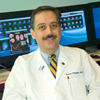 Vasken Dilsizian, MD, Professor, Department of Diagnostic Radiology & Nuclear Medicine, was among the co-authors on “Novel Molecular Angiotensin Converting Enzyme and Angiotensin Receptor Imaging Techniques” in Current Cardiology Reports, 2014 Apr:16(4):466; “Leaning Heavily on PET Myocardial Perfusion for Prognosis” in JACC Cardiovascular Imaging, 2014 Mar;7(3):288-91; and “Impact of Obesity and Bariatric Surgery on Metabolism and Coronary Circulatory Function” in Current Cardiology Reports, 2014 Jan;16(1):433. He and Wengen Chen, MD, PhD, Assistant Professor, were among the co-authors on “Pediatric Presentation of Splenic Marginal Zone Lymphoma on FDG PET/CT Scan” in Clinical Nuclear Medicine, 2014 Feb;39(2):178-80; and on “A Pilot Study of FDG PET/CT Detects a Link Between Brown Adipose Tissue and Breast Cancer” in BMC Cancer, 2014 Feb 25;14:126. Other authors on the latter paper included Qi Cao, BM, PhD, Assistant Professor and Mark Smith, PhD, Associate Professor, both from the Department of Diagnostic Radiology & Nuclear Medicine; Olga Goloubeva, PhD, MSc, Associate Professor, Department of Epidemiology & Public Heath; Katherine Tkaczuk, MD, Professor, Department of Medicine; and Laundette Jones, PhD, Assistant Professor, Department of Pharmacology.
Vasken Dilsizian, MD, Professor, Department of Diagnostic Radiology & Nuclear Medicine, was among the co-authors on “Novel Molecular Angiotensin Converting Enzyme and Angiotensin Receptor Imaging Techniques” in Current Cardiology Reports, 2014 Apr:16(4):466; “Leaning Heavily on PET Myocardial Perfusion for Prognosis” in JACC Cardiovascular Imaging, 2014 Mar;7(3):288-91; and “Impact of Obesity and Bariatric Surgery on Metabolism and Coronary Circulatory Function” in Current Cardiology Reports, 2014 Jan;16(1):433. He and Wengen Chen, MD, PhD, Assistant Professor, were among the co-authors on “Pediatric Presentation of Splenic Marginal Zone Lymphoma on FDG PET/CT Scan” in Clinical Nuclear Medicine, 2014 Feb;39(2):178-80; and on “A Pilot Study of FDG PET/CT Detects a Link Between Brown Adipose Tissue and Breast Cancer” in BMC Cancer, 2014 Feb 25;14:126. Other authors on the latter paper included Qi Cao, BM, PhD, Assistant Professor and Mark Smith, PhD, Associate Professor, both from the Department of Diagnostic Radiology & Nuclear Medicine; Olga Goloubeva, PhD, MSc, Associate Professor, Department of Epidemiology & Public Heath; Katherine Tkaczuk, MD, Professor, Department of Medicine; and Laundette Jones, PhD, Assistant Professor, Department of Pharmacology.
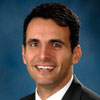 Michael Dimyan, MD, Assistant Professor, Department of Neurology, was among the co-authors on “Nonparetic Arm Force Does Not Overinhibit the Paretic Arm in Chronic Poststroke Hemiparesis” in Archives of Physical Medicine and Rehabilitation, 2014 May;95(5):849-56. Dr. Dimyan and George Wittenberg, MD, PhD, Associate Professor, Department of Neurology, were among the co-authors on “How Do the Physiology and Transcallosal Effects of the Unaffected Hemisphere Change During Inpatient Rehabilitation After Stroke?” in Cinical Neurophysiology, 2014 Feb 28 [Epub ahead of print].
Michael Dimyan, MD, Assistant Professor, Department of Neurology, was among the co-authors on “Nonparetic Arm Force Does Not Overinhibit the Paretic Arm in Chronic Poststroke Hemiparesis” in Archives of Physical Medicine and Rehabilitation, 2014 May;95(5):849-56. Dr. Dimyan and George Wittenberg, MD, PhD, Associate Professor, Department of Neurology, were among the co-authors on “How Do the Physiology and Transcallosal Effects of the Unaffected Hemisphere Change During Inpatient Rehabilitation After Stroke?” in Cinical Neurophysiology, 2014 Feb 28 [Epub ahead of print].
 Rao Gullapalli, PhD, MBA (pictured), Professor; Elijah George, Graduate Student; Steven Roys, MS, Research Associate; Chandler Sours, Graduate Student; Joseph Rosenberg, Research Assistant; Jiachen Zhuo, PhD, Assistant Professor; and Kathirkama Shanmuganathan, MBBS, Professor, all from the Department of Diagnostic Radiology & Nuclear Medicine’s Magnetic Resonance Research Center, were among the co-authors on “Longitudinal and Prognostic Evaluation of Mild Traumatic Brain Injury: A 1H-MRS Study” in the Journal of Neurotrauma, 2014 April 10 [Epub ahead of print].
Rao Gullapalli, PhD, MBA (pictured), Professor; Elijah George, Graduate Student; Steven Roys, MS, Research Associate; Chandler Sours, Graduate Student; Joseph Rosenberg, Research Assistant; Jiachen Zhuo, PhD, Assistant Professor; and Kathirkama Shanmuganathan, MBBS, Professor, all from the Department of Diagnostic Radiology & Nuclear Medicine’s Magnetic Resonance Research Center, were among the co-authors on “Longitudinal and Prognostic Evaluation of Mild Traumatic Brain Injury: A 1H-MRS Study” in the Journal of Neurotrauma, 2014 April 10 [Epub ahead of print].
 Jennifer Hopp, MD (pictured), Associate Professor, Jennifer Pritchard, MD, Epilepsy Fellow, and Jingkun Zhu, MS, all from the Department of Neurology, were among the co-authors on “Overlap Between Dissociation and Other Psychological Characteristics in Patients with Psychogenic Non-epileptic Seizures” in Epilepsy and Behavior, 2014 May;34:47-9.
Jennifer Hopp, MD (pictured), Associate Professor, Jennifer Pritchard, MD, Epilepsy Fellow, and Jingkun Zhu, MS, all from the Department of Neurology, were among the co-authors on “Overlap Between Dissociation and Other Psychological Characteristics in Patients with Psychogenic Non-epileptic Seizures” in Epilepsy and Behavior, 2014 May;34:47-9.
 Seth Kligerman, MD (pictured), Assistant Professor; Jeffrey Galvin, MD, Professor; and Charles S. White, MD, Professor, all from the Department of Diagnostic Radiology & Nuclear Medicine, were among the co-authors on “Missed Pulmonary Emboli on CT Angiography: Assessment With Pulmonary Embolism–Computer-Aided Detection” in AJR/American Journal of Roentgenology, 2014 Jan;202(1):65-73.
Seth Kligerman, MD (pictured), Assistant Professor; Jeffrey Galvin, MD, Professor; and Charles S. White, MD, Professor, all from the Department of Diagnostic Radiology & Nuclear Medicine, were among the co-authors on “Missed Pulmonary Emboli on CT Angiography: Assessment With Pulmonary Embolism–Computer-Aided Detection” in AJR/American Journal of Roentgenology, 2014 Jan;202(1):65-73.
 Nancy Lever, PhD, Associate Professor, Department of Psychiatry, is a co-editor of the Handbook of School Mental Health: Research, Training, Practice, and Policy (2nd edition), recently published by Springer. The handbook provides strategies and recommendations in critical areas of school mental health, such as workforce development, interdisciplinary collaborations, youth/family engagement, consultation, funding, and policy concerns, summarizes the state of current research, and offers directions for further study. Chapters model best practices for promoting wellness and safety, early detection of emotional and behavioral problems, and school-based interventions for students with anxiety, depression, attention deficit hyperactivity disorder, and other common challenges. Other faculty within the Division of Child and Adolescent Psychiatry authored and co-authored chapters in the handbook, including Nicole Brandt, PhD, Assistant Professor; Nicole Cammack, Postdoctoral Fellow; Dana Cunningham, PhD, Clinical Assistant Professor; Eric Slade, PhD, Associate Professor; and Sharon Stephan, PhD, Associate Professor.
Nancy Lever, PhD, Associate Professor, Department of Psychiatry, is a co-editor of the Handbook of School Mental Health: Research, Training, Practice, and Policy (2nd edition), recently published by Springer. The handbook provides strategies and recommendations in critical areas of school mental health, such as workforce development, interdisciplinary collaborations, youth/family engagement, consultation, funding, and policy concerns, summarizes the state of current research, and offers directions for further study. Chapters model best practices for promoting wellness and safety, early detection of emotional and behavioral problems, and school-based interventions for students with anxiety, depression, attention deficit hyperactivity disorder, and other common challenges. Other faculty within the Division of Child and Adolescent Psychiatry authored and co-authored chapters in the handbook, including Nicole Brandt, PhD, Assistant Professor; Nicole Cammack, Postdoctoral Fellow; Dana Cunningham, PhD, Clinical Assistant Professor; Eric Slade, PhD, Associate Professor; and Sharon Stephan, PhD, Associate Professor.
 Erik Lillehoj, PhD (pictured), Associate Professor; Wei Guang, MD, PhD, Research Associate; Steven Czinn, MD, Professor and Chair; and Thomas Blanchard, PhD, Associate Professor, all from the Department of Pediatrics, were among the co-authors on the article “Genetic Regulation of MUC1 Expression By Helicobacter pylori in Gastric Cancer Cells” in Biochemical and Biophysical Research Communications, 2014 Feb 28;445(1):145-50.
Erik Lillehoj, PhD (pictured), Associate Professor; Wei Guang, MD, PhD, Research Associate; Steven Czinn, MD, Professor and Chair; and Thomas Blanchard, PhD, Associate Professor, all from the Department of Pediatrics, were among the co-authors on the article “Genetic Regulation of MUC1 Expression By Helicobacter pylori in Gastric Cancer Cells” in Biochemical and Biophysical Research Communications, 2014 Feb 28;445(1):145-50.
 Mu-Han Lin, PhD, Assistant Professor, Department of Radiation Oncology, was among the co-authors on “Planning Target Volume-to-Skin Proximity for Head-and-Neck Intensity Modulated Radiation Therapy Treatment Planning” in Practical Radiation Oncology, 2014 Jan/Feb;4:e21-29.
Mu-Han Lin, PhD, Assistant Professor, Department of Radiation Oncology, was among the co-authors on “Planning Target Volume-to-Skin Proximity for Head-and-Neck Intensity Modulated Radiation Therapy Treatment Planning” in Practical Radiation Oncology, 2014 Jan/Feb;4:e21-29.
 Eric Manheimer, PhD, Research Associate, Department of Family & Community Medicine and the Center for Integrative Medicine, was a co-author on “A Summary of a Cochrane Review: Green and Black Tea for the Primary Prevention of Cardiovascular Disease” in Global Advances in Health and Medicine, 2014 Mar; 3(2):66-67.
Eric Manheimer, PhD, Research Associate, Department of Family & Community Medicine and the Center for Integrative Medicine, was a co-author on “A Summary of a Cochrane Review: Green and Black Tea for the Primary Prevention of Cardiovascular Disease” in Global Advances in Health and Medicine, 2014 Mar; 3(2):66-67.
 Minesh Mehta, MB, ChB, Professor, Department of Radiation Oncology, was among the co-authors on “Is It Time to Reevaluate the Management of Patients With Brain Metastases?” in Neurosurgery, 2014 Mar 21 [Epub ahead of print]. He was also among the authors of “Benefit from Procarbazine, Lomustine, and Vincristine in Oligodendroglial Tumors is Associated With Mutation of IDH” in the Journal of Clinical Oncology, 2014 Mar;32:783–790.
Minesh Mehta, MB, ChB, Professor, Department of Radiation Oncology, was among the co-authors on “Is It Time to Reevaluate the Management of Patients With Brain Metastases?” in Neurosurgery, 2014 Mar 21 [Epub ahead of print]. He was also among the authors of “Benefit from Procarbazine, Lomustine, and Vincristine in Oligodendroglial Tumors is Associated With Mutation of IDH” in the Journal of Clinical Oncology, 2014 Mar;32:783–790.
 Adam Reese, MD, Resident; Wei Lu, PhD (pictured), Assistant Professor; and William Regine, MD, Professor and Chair, all from the Department of Radiation Oncology, were among the co-authors on “Utilization of Intensity-Modulated Radiation Therapy in Pancreatic Cancer: Is It Beneficial?” in Seminars in Radiation Oncology, 2014 Apr;24:132–139.
Adam Reese, MD, Resident; Wei Lu, PhD (pictured), Assistant Professor; and William Regine, MD, Professor and Chair, all from the Department of Radiation Oncology, were among the co-authors on “Utilization of Intensity-Modulated Radiation Therapy in Pancreatic Cancer: Is It Beneficial?” in Seminars in Radiation Oncology, 2014 Apr;24:132–139.
 Horea Rus, MD, PhD (pictured), Professor; Cosmin Tegla, MD, Postdoctoral Fellow; Christopher Bever, MD, Professor; and Walter Royal, III, MD Professor, all from the Department of Neurology, and Violeta Rus MD, PhD, Associate Professor, Department of Medicine, were among the co-authors on “SIRT1 is Decreased During Relapses in Patients With Multiple Sclerosis” in Experimental and Molecular Pathology, 2014; 96(2):139-148.
Horea Rus, MD, PhD (pictured), Professor; Cosmin Tegla, MD, Postdoctoral Fellow; Christopher Bever, MD, Professor; and Walter Royal, III, MD Professor, all from the Department of Neurology, and Violeta Rus MD, PhD, Associate Professor, Department of Medicine, were among the co-authors on “SIRT1 is Decreased During Relapses in Patients With Multiple Sclerosis” in Experimental and Molecular Pathology, 2014; 96(2):139-148.
 Kathy Ryan, MS, Bioinformatics Analyst; Yu-Ching Cheng, PhD (pictured), Assistant Professor; Patrick McArdle, PhD, Assistant Professor; and Braxton Mitchell, PhD, Professor, all from the Department of Medicine; along with John Cole, MD, MS, Associate Professor; Mary Sparks, RN, Study Coordinator; and Steven Kittner, MD, MPH, Professor, all from the Department of Neurology, were among the co-authors on “Prevention Opportunities For Oral Contraceptive-Associated Ischemic Stroke” in Stroke, 2014 Mar;45(3):893-5.
Kathy Ryan, MS, Bioinformatics Analyst; Yu-Ching Cheng, PhD (pictured), Assistant Professor; Patrick McArdle, PhD, Assistant Professor; and Braxton Mitchell, PhD, Professor, all from the Department of Medicine; along with John Cole, MD, MS, Associate Professor; Mary Sparks, RN, Study Coordinator; and Steven Kittner, MD, MPH, Professor, all from the Department of Neurology, were among the co-authors on “Prevention Opportunities For Oral Contraceptive-Associated Ischemic Stroke” in Stroke, 2014 Mar;45(3):893-5.
 Terez Shea-Donohue, PhD, Professor, and Aiping Zhao, MD, Associate Professor, both from the Department of Radiation Oncology, were among the co-authors on “SerpinB2 Mediated Regulation of Macrophage Function During Enteric Infection” in Gut Microbes, 2014 Feb 5;5(2) [Epub ahead of print].
Terez Shea-Donohue, PhD, Professor, and Aiping Zhao, MD, Associate Professor, both from the Department of Radiation Oncology, were among the co-authors on “SerpinB2 Mediated Regulation of Macrophage Function During Enteric Infection” in Gut Microbes, 2014 Feb 5;5(2) [Epub ahead of print].
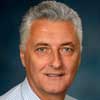 Zeljko Vujaskovic, MD, PhD, Professor, Department of Radiation Oncology, was among the co-authors on “Thermal Dosimetry Characteristics of Deep Regional Heating of Non-Muscle Invasive Bladder Cancer” in the International Journal of Hyperthermia, 2014 Mar 26 [Epub ahead of print]. He was also among the co-authors on “Robust Rat Pulmonary Radioprotection By a Lipophilic Mn N-alkylpyridylporphyrin, MnTnHex-2-PyP(5+)” in Redox Biology, 2014 Jan 8;2:400–410.
Zeljko Vujaskovic, MD, PhD, Professor, Department of Radiation Oncology, was among the co-authors on “Thermal Dosimetry Characteristics of Deep Regional Heating of Non-Muscle Invasive Bladder Cancer” in the International Journal of Hyperthermia, 2014 Mar 26 [Epub ahead of print]. He was also among the co-authors on “Robust Rat Pulmonary Radioprotection By a Lipophilic Mn N-alkylpyridylporphyrin, MnTnHex-2-PyP(5+)” in Redox Biology, 2014 Jan 8;2:400–410.


